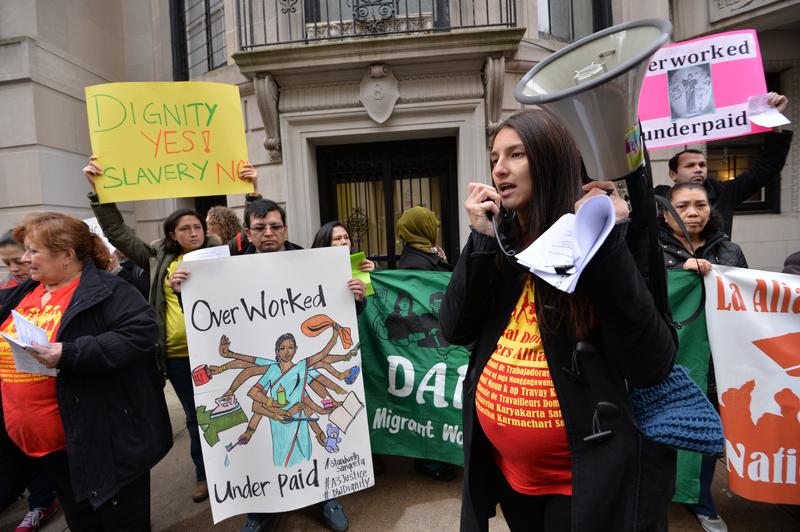
India's response to the arrest of one of its New York consular officials has been so overheated — and so willfully oblivious to a pattern of labor issues — it makes one wonder how far this international face-off will go.
Devyani Khobragade, the Deputy Consul General, was charged with paying her live-in housekeeper and nanny, Sangeeta Richard, only about $3 an hour, and lying on her visa application. Within days, Khobragade's arrest — and her strip-search at the hands of the U.S. Marshalls Service — had set off protests across India and angry denunciations from top Indian government officials.
In retaliation for her arrest, the Indian government removed security barriers from around the US embassy in New Delhi. A senior politician even threatened to arrest the same-sex companions of American diplomats living in India.
Of course, the human face of this whole episode has been the accused, Devyani. She's the one you see pictured in pretty much every story, an attractive young woman in a sari, smiling at the camera. This is the image that's set off protests across India.
What you never see are images of her accuser, Sangeeta Richard. She's been kept out of the public eye.
But whatever picture you see, this isn't an isolated incident. This is the third scandal involving an Indian consular official in New York in three years.
In 2011, the Indian consul general, Prabhu Dayal, was accused in a civil suit of labor violations by his live-in help. In Dayal's case, the plaintiff was represented by Legal Aid, who would only say the case was resolved — no further comment.
But the other case was against a diplomat named Neena Malhotra. And a federal judge ruled in favor of Malhotra's maid, Shanti Gurung, awarding her nearly $1.5 million dollars in damages.
However, Martina Vandenberg, who runs the Human Trafficking Pro Bono Legal Center, said the money has not been paid.
"The victim has received absolutely nothing," said Vandenberg.
What's worse, she said, is that the government of India joined with the Malhotras, "and filed a lawsuit against the plaintiffs for the victims in the U.S. and all her lawyers. And that case was filed specifically to prevent any enforcement" of the judgment.
India's External Minister and other government officials have insisted this week that Devyani Khobragade shouldn't have been arrested. That her relationship with her domestic worker has nothing to do with US labor laws. And that if anything, it's a matter between India and the US state department. Vandenberg says that's not right at all—the Indian government has been aware of its officials' legal obligations to their own domestic workers.
"That consular office should have been on notice," said Vandenberg. "The State Department has been entirely clear — not for one year, not for two years, for more than a decade — that consular officers have to follow U.S. law in their treatment of domestic workers."
For Indians who are active in fighting for the rights of domestic workers, it's been an extraordinary, at times infuriating episode. Neha Misra is the senior specialist in Migration and Human Trafficking at the Solidarity Center, and says she feels simultaneously excited that the U.S. took action against a diplomat, and saddened at the response from India.
"The Indian diplomat and the domestic worker victim are Indian, and yet everything I've seen from the Indian government and social media has been in defense of the diplomat. And it's pointing out some of the ugly side of India."
That includes the idea that the exploitation of a domestic worker pales in comparison to the arrest of an Indian elite. That earning around $3 an hour was actually a great deal, at least by Indian standards. That maybe she conspired against her boss, or was even an American spy. India has turned diplomat Devyani Khobragade, the accused, into the victim, and made her powerless maid the villain. At the same time, Misra marvels that the US attorney who brought the charges, Preet Bharara, is also Indian.
"I think he's a hero," she said, "and I think we should be thanking him for standing up for the rights of the Indian citizen who was the weaker party here, who had less power, and was willing to stand up for her rights, instead of the diplomat. And he's being called an Uncle Tom. And it makes me really sad."
But for Misra and other human rights advocates, the hope in a case like this is that it'll move beyond the hysteria and force India pay more attention to the rights of its domestic workers.
